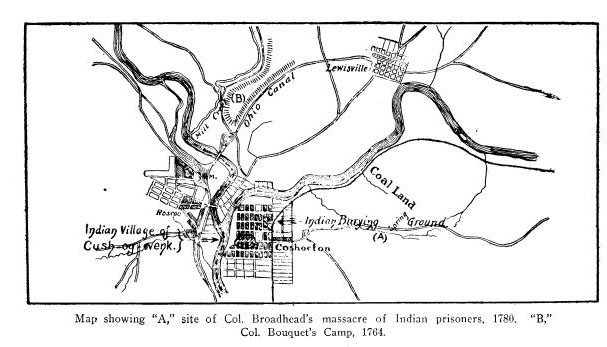Ohio History Journal
THE INDIAN VILLAGE
OF "CUSH-OG-WENK."
BY THOMAS H. JOHNSON, COSHOCTON.
The generations who were active
participants in the events
which constitute the early history of
Ohio having passed away,
it seems to me the imperative duty of
those now living, whose
early life overlapped the survivors of
the active participants in
the stirring events of that earlier
period, to place on record any
recollections they may have of the
stories told by those old sur-
vivors tending to identify the
localities connected with such his-
torical events. I therefore venture to
submit the following com-
munication relative to certain
localities of historical interest, at
and near the town of Coshocton, with a
view to its preservation
in the Archives of the Ohio State
Archaeological and Historical
Society.
In so doing it is proper to state, in
explanation of my source
of information, that I was born and
raised in the town of Coshoc-
ton; that my Grand-mother, the widow of
David Johnson, of
County Tyrone, Ireland, married James
Renfrew, of Coshocton
and brought her five children to that
place about 1820, while some
of the Indians still remained in the
vicinity.
From statements of my father, W. K.
Johnson, and my
Uncle, John Johnson, and also of some of
the older settlers who
still survived in my boyhood days, among
whom I may mention
Captain Neff and Jesse Workman, I have
information which I
feel should be placed of record before
it is wholly lost.
First. The Indian Village of "Cush-og-wenk,"*
(improperly
*In the records of the several
expeditions into this region, the
name of this Indian Village is generally
misspelled Gosh-og-wenk. In
the Delaware tongue "Cush" is
Bear. "Cush-og," Black Bear, and "wenk"
is town. In central Pennsylvania
the word survives in the names of
certain streams, in the following forms,
viz.: "Cush Creek"-Bear Creek;
"Cushian Creek"-Cub Creek;
"Cush Cushian"-Bear and Cub Creek.
The termination "wenk" was
Anglicised by the early settlers, and the
place become known as "Cush-og-town,"
from which it derived the later
and present form "Coshocton."
(432)
